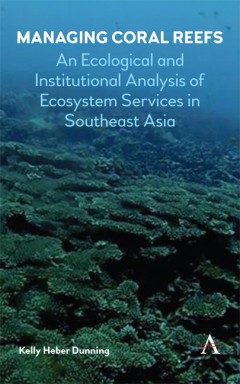Managing Coral Reefs
An Ecological and Institutional Analysis of Ecosystem Services in Southeast Asia
By Kelly Heber Dunning
Other Formats Available:
E-Book- About This Book
- Reviews
- Author Information
- Series
- Table of Contents
- Links
- Podcasts
About This Book
‘Managing Coral Reefs’ examines Indonesia’s and Malaysia’s pathways to implementing the international Convention on Biological Diversity (CBD), focusing specifically on how regional and national policies in Southeast Asia have fared when implementing the Aichi Targets of the CBD. These targets include safeguarding ecosystems through protection and ensuring that benefits from ecosystems can be enjoyed by all. Kelly Heber Dunning examines CBD implementation through marine protected areas (MPAs) for corals reefs in Indonesia and Malaysia.
Coral reefs, along with mangroves and seagrass, provide stakeholders with livelihoods in fisheries and tourism; they are also efficient natural barriers against extreme weather and climate change–related hazards. While Indonesia uses a co-managed framework, whereby villages and governments share power, to implement its MPAs, Malaysia uses a top-down network of federally managed Marine Parks. Using mixed methods through interviews and surveys as well as coral reef ecology surveys conducted over a year of fieldwork, Dunning argues that co-managed systems are the current best practice for implementing the CBD’s Aichi Targets in tropical developing countries. Not only do they prevent ecosystems from many local forms of degradation, but they also are seen as more legitimate by local resource user stakeholders, allowing them more adaptive capacity to manage the ecosystems under conditions of uncertainty, as well as allowing for a more integrated form of management whereby ecological, economic, and social considerations can be made for management decisions. Centralized MPAs can mimic the successes of co-managed systems through better stakeholder engagement, possibly with greater socio-ecological success in the long run, due to their superior financial, administrative and organizational powers.
Reviews
“In Managing Coral Reefs, Dunning has taken on one of the most difficult problems in marine policy—that of comparing the effectiveness of top down versus bottom-up institutions for conserving biological diversity. […] A range of specific policy recommendations makes this work essential for both the practitioner and the stakeholder.”
—Porter Hoagland, Senior Research Specialist, Marine Policy Center, Woods Hole Oceanographic Institution, USA
“This timely book [...] is a worthwhile contribution to the growing literature on marine protected areas, conservation and management.”
—Lyndon DeVantier, coral reef ecologist
Author Information
Kelly Heber Dunning is the Coastal Training Program Coordinator at the University of Texas at Austin Marine Science Institute and at the Mission Aransas National Estuarine Research Reserve, USA. A PhD from the Massachusetts Institute of Technology, Dunning’s research on Southeast Asian coral reefs was funded through a United States Fulbright Award. She has also received other prestigious awards including the MIT Presidential Fellowship and the Caroll L. Wilson Fellowship.
Series
Strategies for Sustainable Development Series
Table of Contents
List of Figures; List of Tables; Acknowledgments; List of Abbreviations; 1. Introduction; 2. Theory, Practice and Policy Context of Coral Reef Management; 3. Governing Natural Resources in Indonesia and Malaysia; 4. Case Study Sites and the Coral Triangle; 5. Integrated Management of Marine Protected Areas; 6. Legitimate Marine Protected Areas; 7. Adaptive Capacity of Marine Protected Areas; 8. Policy Recommendations for Marine Protected Area Management in Developing Countries; Appendix A. Research Design; Appendix B. Data and Methods; Appendix C. Coral Cover Results; References; Index.
Links
Stay Updated
Information
Latest Tweets



